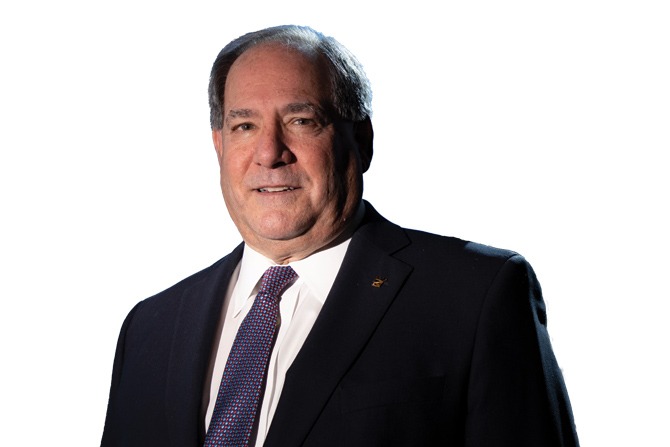MIBA recently interviewed Mitch Baden, the president and CEO of Royal Banks of Missouri, about his life, career and work perspectives.
Mitch was born in St. Louis, Missouri, and has lived most of his life there. Mitch’s father, Arthur Baden, worked at a meat processing plant. “Dad started as the cleanup man in the meat plant. He was a smart guy and worked hard,” said Mitch. “Everybody liked him; he was the life of the party! My dad worked his way up to become the No. 2 person and the head of sales. He died far too young.”
Arthur and his wife Betty had four boys and a daughter. He died at 39 of colon cancer when Mitch was only 12. Before Arthur died, he arranged for his three older sons to work at the plant. He wanted them to understand the importance of a college education. It worked. Banking was easy compared to the work they did at the plant.
Mitch’s older brother Steve started Mitch in banking and helped raise the two youngest children. “I have always looked up to Steve, and I was proud to follow in his footsteps,” said Mitch. “Steve was the CEO at Royal Banks of Missouri for more than 20 years and retired in 2018. He was a great banker.”
Mitch’s older brother Dale is now the national sales manager for a company in San Antonio. Mitch’s younger sister Donna worked as an office manager but has now retired with her husband. The youngest child, Larry Baden, has a Ph.D. from the University of Kansas and is a journalism professor at Webster University in St. Louis.
Mitch is the middle child and began working as a teller in June 1972 as a high school junior. Steve was working as a controller at Creve Coeur Bank, and Mitch visited him just after a teller was fired. “The head teller, Dee Pickle, came in ranting. Steve told her I was looking for a job, and she asked me three questions. The first was whether I could count backward by 10, the second was if I could add 10 and 20 together, and the third question was whether I could start working the next day. After that, I worked for the bank every year at Christmas and in the summer. She taught me that helping young people grow their careers was important. She probably put 20 young people my age through college. When she died, there were hundreds of successful bankers at her funeral. She touched the lives of 20 people now helping to run banks. I am one!”
Mitch spent six years in Columbia, Missouri, while he and his wife, Robin Rone-Baden, earned degrees at the University of Missouri at Columbia. He earned a four-year B.S. degree. Robin earned a graduate degree in elementary school counseling. They stayed in Columbia an extra couple of years so she could finish her work before they returned to St. Louis. After Mitch had finished college, and while his wife was finishing her academic work, he worked at Boone County National Bank.
“I will tell anybody that the foundation for anything good in my life happened because I spent four years at Mizzou,” said Mitch. “I met my wife and bought my first house there. I also worked for Mike Stroup at Boone County National Bank. He gave me my first opportunity in management. I ran a credit department when I was 22 or 23. He sent me to other banks to learn how to put together the department. I am where I am because of him.” (Later, Central Bank bought Boone County National Bank.) “My mentors, Steve, Dee and Mike, helped create a very rewarding career. Because of their example, I really believe that my legacy is to help mentor and grow careers for young people the same way they did for me.”
Mitch has three recommendations for anyone he mentors. “It doesn’t take a lot of talent to be early,” he said. “Our most precious resource is our time. One of our clients taught me this concept. I tell our team to be the first person in the room and the first to shake someone’s hand. Respect a person’s time!”
His second recommendation is to love what you are doing. “You spend more waking hours at work than with the family you love,” he said. “Nothing is worse than going to a job you hate. If I sense a team member is not happy, I discuss how we can make it a more fulfilling opportunity. If we can’t, then I encourage them to find a role that is satisfying! Life is too short; why work a job if you don’t love it?
The third recommendation is to learn something new every day. “Know what you don’t know, and find ways to improve yourself,” said Mitch.
In St. Louis, Mitch worked very briefly at Landmark Bank and, later, at Boatmen’s Bank for five years. “Mike Stroup was the first person I called to thank when I became a VP,” said Mitch. But Mitch wanted more of a challenge, so he moved to Mercantile Bank for 13 years and South Side National Bank. When that bank sold, Mitch joined Steve at Royal.
Mitch attended St. Lewis University (SLU). “I stumbled on to the Jefferson Smurfit School for Entrepreneurial Studies. I attended the program and taught several classes as well. I figured if I was going to do business with small-business owners, I needed to understand what their leaders were thinking. Small-business owners think in a totally different way. What I learned in that program has had a big impact on how we run our own company.”
Mitch also graduated from the ABA National Commercial Lending School. For years Mitch was the chair of the Minority Business Council in St. Louis, Missouri. He was also honored as the Missouri Financial Services Advocate by the United States Small Business Administration. “I thought about starting a new bank after South Side was sold, but Steve suggested I join him at Royal so we could work together.” He laid our foundation and gave me the chance to grow to where we are today!”
“Bankers don’t die; they just go to new banks,” said Mitch. “Almost all of our Royal management team came from larger banks. What makes us different and a great community bank is we choose to work at a community bank. We prefer the personalized, one-on-one service of a smaller bank. We all know what it feels like to be at a large bank where clients can become a number. We didn’t like that culture. Like other community bankers, we prefer to develop relationships with our clients.”
When Steve decided to retire, Mitch interviewed for Steve’s position. “I didn’t expect the board to choose me. Steve and I are not owners. I was 63 and thought they might want a younger person or be tired of having a Baden in charge. I am blessed to work for great principal shareholders, Linda and Matt Renner and Steve Pessin. They gave me the opportunity of a lifetime. I don’t want to disappoint them. I owe them my best efforts. I do not take it for granted!” During his interviews, Mitch told the board he wanted the bank to be a relevant shareholder investment by growing shareholder value and improving client experience.
“I’ve worked for great people who want to make the bank as successful as possible, and I’m probably a better manager and think more strategically because this job came later in my career,” said Mitch. “Most people have difficulty believing I am 67. I’m energized by our team, and I’m having too much fun to retire. I’m very energetic and enjoy working long hours. Being active and creative keeps your mind sharp. I work with an amazing group of young people, and their energy keeps me young.”
Within 45 days of taking over as CEO, the bank was presented with a major acquisition opportunity. The expansion increased revenue, and the bank has had record dividends for the last three years, but the bank is still community-focused. Mitch understands that employees are the bank’s biggest assets. Despite bringing in five new locations and growing to 17 locations, the bank did not lay off any employees and has continued to invest in its communities. The Royal Bank of Missouri has replaced drive-up windows with interactive tellers and is the only one in St. Louis to expand its hours. To reach the interactive tellers, customers can drive or walk up to an ATM, press a button and connect to one of Royal’s most experienced tellers.
“Clients love the individual service,” said Mitch. “Transaction times are longer because people are visiting with friends. One elderly client in his 90s told us he was moving the accounts he’d had with us for 50 years because he didn’t want to do business with an out-of-town service center. I told him we were not going out of the market. I showed him he would work with the same friends he has had for years. He is still a client today! Community banks are a part of the fabric of the communities they serve. I tell our team that we have failed if we start acting like a big bank.”
When Royal purchased another bank last year, regulators repeatedly asked what Royal Bank would do with a facility in Center, Missouri. The office is in a community of 500 people. Center had farmers and clients who had banked there since the 1930s, and it is the only bank in town. Mitch said, “Why do you keep asking us about the Center location?” The regulators answered that they were concerned Royal Bank would close the facility center to be more efficient. Mitch said, “We are not planning to close or lay anyone off! I can commit to you that we are not closing our Center office.”
Mitch knows he has worked with great people who shaped his career. “I hope I honor them by doing good things,” he said. He has also been blessed with great opportunities. However, watching young team members grow has become the most rewarding part of his career. He said, “When I took over the job, I knew it wouldn’t be for 20 years. My legacy wouldn’t be the bank I took over; it would be the people I leave in charge after I retire. I watch young people really grasp our business and understand how important what we do is for our clients. It is very gratifying. I love molding the next generation of community bankers. Our management team is very young, and they are doing a great job. This story should be about them!”
He also values the relationships he has formed with clients. “My longest client has been with me almost 35 years and has joined me at three banks. You become a financial partner. You may not be an owner, but you are invested. Most likely, if someone were in my role in a big bank, they wouldn’t handle clients. As it is, I know my clients and work with them daily. I can say hello if I see them in a restaurant. I see many of them at church; my children probably went to school with their children. We want our communities to thrive because this is our home. We donate hundreds of thousands of dollars into our markets.”
MIBA makes it easier for Mitch to reach out to people he knows and trusts. “I can run an idea by other bankers, and they will give me an honest answer,” he said. “We may be competitors, but we are both in the business for the same reason, to make our communities thrive, so we don’t view each other as a threat. MIBA gives us the ability to network with other successful people. That is unbelievably important.”
MIBA also benefits members by providing training opportunities. “Training is a tremendous resource for our employees and me, personally,” he said. “During COVID, MIBA helped keep our staff trained and continued providing programs online and Zoom instead of shutting down.”
Mitch sees several challenges currently facing the community banking industry. “I think some regulators want to have fewer banks,” he said. “They think banks will be more efficient if they reduce our number. That’s a threat to community banks. We are trying hard to find good people, grow from within and do what we can to be solid citizens every way we can.”
The second challenge is nontraditional bank competitors like credit unions and online lenders. “We need to level the playing field,” said Mitch. “First, credit unions don’t play by the same rules as we do. They became major competitors the day regulators allowed credit unions to provide commercial loans. Providing a competitive pricing advantage is huge when you do not have to pay taxes. Most credit unions are tax-exempt. Online lenders are changing the lending landscape, but I wonder if the ease of borrowing will ever replace a personal relationship. When things are going well, anyone can be a good lender. The truly great lender is the one who sticks with you in tough times.”
Mitch thinks bankers must invest in and build their communities to deal with these challenges. “Community bankers live in our communities. We are active and reinvest our resources in our local markets,” said Mitch. “These are markets we call home!
Mitch and Robin have three children, a daughter and two sons aged 37, 30 and 28. The two sons started their careers at other banks but now work at Royal. One son is head of the mortgage group, and the youngest son is the assistant manager on the retail side.
Mitch and his wife sponsor and support many local charitable organizations within their community. One favorite is Operation Shower, which started in St. Louis. The website address is https://operationshower.org. The charity provides baby showers for women in the military or women whose husbands are in the military.
The PGA Tour partners with Operation Shower. “These young parents think they are going to get diapers and a blanket, but it is much more,” said Mitch. “It’s a great charity that honors the service of people who are willing to put their lives on the line for our freedom.”
Mitch’s main interest away from work is sports. “I love sports, but the only game I play is golf,” Mitch said. “I am also a huge supporter of the Mizzou football program and SLU basketball.
At the end of the interview, Mitch said, “I’m so blessed by the opportunity our ownership has given us, and so blessed to be working with a great group of young people. What we’re doing as bankers is a lot of fun. If you are in your late 50s or early 60s, I recommend jumping at any opportunity that comes your way.”






